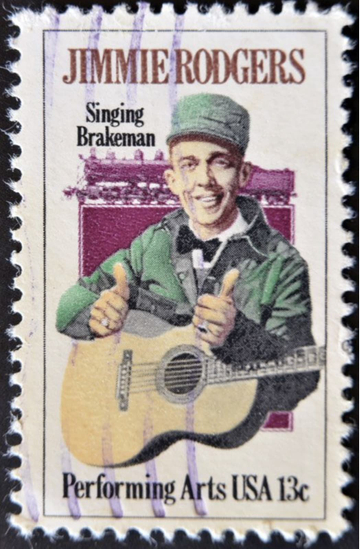Jimmie Rodgers Biography
James Charles Rodgers (September 8, 1897 – May 26, 1933) was an American singer-songwriter and musician who rose to popularity in the late 1920s. Widely regarded as "the Father of Country Music", he is best known for his distinctive rhythmic yodeling. Unusual for a music star of his era, Rodgers rose to prominence based upon his recordings, among country music's earliest, rather than concert performances – which followed to similar public acclaim.
Rodgers' affinity for entertaining came at an early age, and the lure of the road was irresistible to him. By age 13, he had twice organized and begun traveling shows, only to be brought home by his father. His father found Rodgers his first job working on the railroad, as a water boy. Here he was further taught to pick and strum by rail workers and hobos.
As a water boy, he would have been exposed to the work chants of the African-American railroad workers, known as gandy dancers. A few years later, he became a brakeman on the New Orleans and Northeastern Railroad, a position formerly held by his oldest brother, Walter, who had been promoted to conductor on the line running between Meridian and New Orleans.
In 1924 at age 27, Rodgers was diagnosed with tuberculosis. The disease temporarily ended his railroad career, but at the same time gave him the chance to get back into the entertainment industry. Rodgers went to the Victor studios in Camden, New Jersey and recorded four more sides, including "Blue Yodel". Better known as "T for Texas", it featured a yodel Rogers claimed to have learned "after he caught a troupe of Swiss emissaries doing a demonstration at a church.
"[5] In the next two years this recording sold nearly half a million copies, rocketing Rodgers to stardom. After this he determined when Peer and Victor would record him, and sold-out shows whenever and wherever he played. On July 16, 1930, he recorded "Blue Yodel No. 9" with Louis Armstrong on trumpet and Armstrong's wife Lil on piano. A song written by Clayton McMichen and recorded as "Prohibition Has Done Me Wrong" was not issued, possibly because of copyright conflicts with Columbia.
Rodgers' penultimate recordings were made in August 1932 in Camden, and the tuberculosis clearly was getting the better of him. He had given up touring by that time, but did have a weekly radio show in San Antonio, Texas, where he had relocated when "T for Texas" ("Blue Yodel Number 1") became a hit. It was not in Rodgers' make-up to stay still, though, and his constant touring and recording schedule only hurt his chances of recovery.
During this final recording session Rodgers was so weakened from years of fighting tuberculosis that he had a nurse accompanying him on May 24, and needed to rest on a cot between songs. He died of tuberculosis in a New York hotel two days later. His body was placed in a train in a pearl grey coffin and sent back to his home in Meridian, Mississippi.
He was buried in Oak Grove Cemetery in Meridian.







































